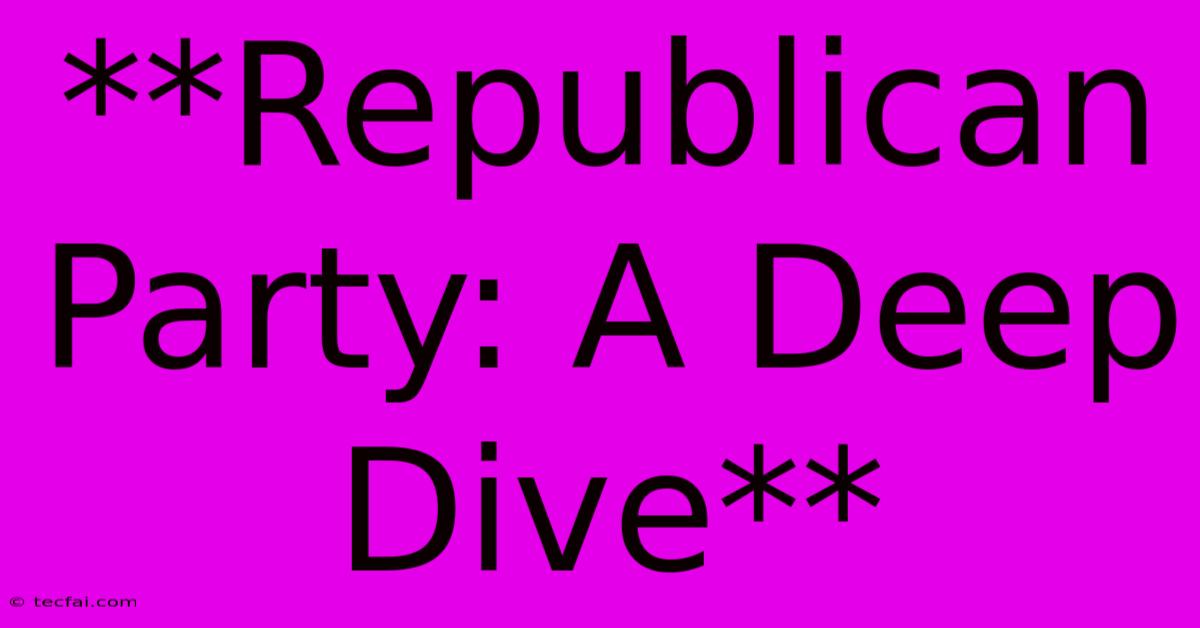**Republican Party: A Deep Dive**

Discover more detailed and exciting information on our website. Click the link below to start your adventure: Visit Best Website tecfai.com. Don't miss out!
Table of Contents
Republican Party: A Deep Dive into American Politics
The Republican Party, one of the two major political parties in the United States, has a long and complex history. Its policies and stances on key issues have evolved over time, shaping the political landscape of the nation. This article delves into the Republican Party's origins, core values, platform, and its impact on American politics.
Origins and Early History
The Republican Party was founded in 1854, primarily in response to the Kansas-Nebraska Act, which allowed for the potential expansion of slavery into new territories. This act deeply divided the nation, with anti-slavery advocates uniting under the banner of the Republican Party. Abraham Lincoln, a prominent Republican, became the party's first president in 1860.
Core Values and Beliefs
The Republican Party platform is centered around several core values:
- Individual liberty: Republicans believe in limited government intervention in the lives of individuals, emphasizing personal responsibility and free markets.
- Free enterprise: The party advocates for a strong economy driven by private businesses and minimal government regulation.
- Fiscal responsibility: Republicans generally favor lower taxes and reduced government spending, aiming to balance the budget and reduce national debt.
- Strong national defense: The Republican Party champions a robust military and a strong national defense policy to protect American interests at home and abroad.
- Traditional values: Social issues often hold a significant place in Republican ideology, with a focus on family, faith, and patriotism. The party often takes a more conservative stance on social matters.
Key Platform Issues
The Republican Party has a wide range of stances on contemporary issues, including:
- Economy: Republicans generally favor tax cuts, deregulation, and free trade agreements to stimulate economic growth.
- Healthcare: The party often advocates for market-based healthcare solutions, opposing government-run healthcare systems and emphasizing individual responsibility for health choices.
- Immigration: Republicans have differing views on immigration policies, with some advocating for stricter border security and reduced legal immigration, while others support a path to citizenship for undocumented immigrants.
- Education: The party emphasizes parental choice in education, supporting school choice programs and charter schools.
- Gun control: Republicans generally oppose stricter gun control laws, advocating for individual rights to gun ownership as enshrined in the Second Amendment.
Influence and Impact
The Republican Party has played a major role in shaping American politics, influencing legislation, judicial appointments, and cultural discourse. Their emphasis on limited government, individual responsibility, and free markets has significantly impacted the American economy and social fabric. The party's recent successes in elections, particularly at the national level, have cemented its role as a major force in American politics.
Challenges and the Future
The Republican Party faces challenges in adapting to changing demographics and social trends. Balancing traditional values with the evolving needs of a diverse nation will be a key challenge for the party in the coming years. The party's internal divisions on various issues, including economic policies and social issues, also pose a challenge to its unity and ability to present a coherent message to the electorate.
The future of the Republican Party will likely depend on its ability to navigate these challenges and adapt to the changing political landscape. Its success in the future will hinge on its ability to attract a broad base of support, articulate its core values effectively, and provide compelling solutions to the challenges facing the nation.

Thank you for visiting our website wich cover about **Republican Party: A Deep Dive**. We hope the information provided has been useful to you. Feel free to contact us if you have any questions or need further assistance. See you next time and dont miss to bookmark.
Featured Posts
-
Who Is Jill Stein And Why Does She Matter
Nov 06, 2024
-
2024 Us Election Trump Or Harris The Contenders
Nov 06, 2024
-
Kelleher Excited For Anfields Crowd
Nov 06, 2024
-
Could Jill Stein Decide 2024 Election
Nov 06, 2024
-
Local Disc Orgs Apply For Usa Ultimate Grants
Nov 06, 2024
